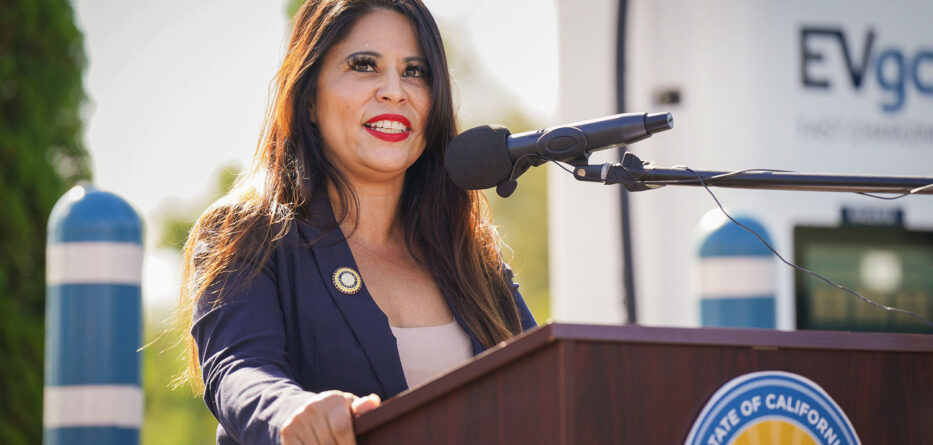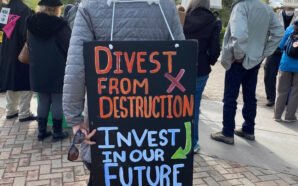Alejandra Reyes-Velarde
CalMatters
On Nov. 22, Assembly Speaker Robert Rivas appointed new leadership in the state Legislature, including 23 female leaders of various Assembly committees, including 14 women of color. Included in that list is Assemblymember Liz Ortega, who will lead the Labor committee on the heels of a strike-filled summer and several wins for low-wage workers.
Ortega is an immigrant from Mexico and an Oakland-raised former labor leader, who joined the state Legislature nine months ago. As statewide political director for AFSCME Local 3299, she helped pass legislation to protect essential service jobs at University of California campuses. She also was the first Latina elected executive secretary-treasurer of one of the largest labor councils in the state, the Alameda Labor Council.
CalMatters interviewed the assemblymember about her appointment and her hopes for labor policy.
How does your background impact your decision-making as head of the Labor committee?
I came to this country when I was 4 years old. First my dad came, and my mom got tired of waiting for him and decided she was going to make the dangerous trip by herself with my little brother at 6 months old and me at 3 years old, looking for that American dream. My dad worked as a dishwasher for 15 years and my mom did a variety of different jobs. A lot of times they didn’t have access to health care or were looking for other jobs or were struggling to make ends meet, so I started translating for them in kindergarten. Anything they needed, I was that person.
I remember one particular instance when … President Reagan passed amnesty and we were eligible to apply for our residency card. I remember getting in line at 2 or 3 in the morning, in the cold, and having to fill out paperwork as a 9-year-old, very important paperwork. I remember my mom saying, “You’re going to figure it out and you’re not just going to figure it out for us. You’re going to figure it out for all these other families.” I remember being overwhelmed, but also knowing that a lot was at stake and that I needed to do it right, because there was no one there to help.
I think my background as a labor leader and immigrant and a woman would definitely impact my decision-making because it’s the reason I ran … I’ve grown up watching the income inequality in the fourth largest economy in the world and have really learned from a young age, not just what it looks like, but what it takes to make a difference … for working families.
You were the political director for AFSCME Local 3299. What did you learn there that you’ll bring to this role?
I was a lobbyist working in the Capitol. One very particular lesson I took from my time at AFSCME was that a lot of decisions are made when most people aren’t looking or can’t come to a hearing or call in or participate in the process. And something as minor as a period or a comma can make a huge difference in everyday people’s lives. And unless you have the willingness to work day and night and be able to look for those things, most working families aren’t prioritized.
What do you consider the biggest labor priorities in the 2024 legislative session?
I’m very honored the speaker has entrusted me with this responsibility. I came to the Legislature only nine months ago, fresh out of COVID, and watched a lot of progress that we had made for workers kind of go backward, particularly when it comes to women in the workplace. It’s really sad and infuriating that in the fourth largest economy in the world, women still earn less than non-Hispanic white men and particularly Latinas.
I recently read an article about Americans having to work past the age of 70 because they can’t afford to retire. That number is expected to increase even higher with lack of access to health care or a lot of folks working in industries that took huge hits.
I want to see more accountability and enforcement. As legislators we tend to pass a lot of laws … that can make a huge difference in working families’ lives, but a lot of times we don’t do the follow-up work or the enforcement. For example, I know OSHA is very understaffed and underfunded. I want to look into how we take the great laws we have to help both employers and workers and really look at what we need to do next in terms of acceptability and enforcement.
Assemblymember Ash Kalra did a wonderful job with a lot of things that were passed, such as increasing wages… What I want to do is continue this great work but also increase the focus on women in the workplace, seniors in the workplace and that accountability and enforcement piece.
Business groups claim that higher wages will raise their costs which will then trickle down to consumers. How do you plan to balance the concerns of business interests and passing through labor legislation?
I’ll approach it the same way I did when I was the head of one of the largest labor councils in the state, which is … being in open communication with both employers and labor workers.
The reality is that there’s a big income inequality gap. There are a lot of millionaires and billionaires making a lot of money, and unfortunately it’s not trickling down to the workers and to our communities. So I’ll be looking at that data to be able to take a balanced approach to my decision-making.
Although some of the strikes have ended and actors, writers, UPS workers have received fair contracts, there are still ongoing strikes for the lowest paid workers, those in the hotel and food service industries. What do you think will be necessary to make sure that those workers get fair contracts and labor conditions?
Strikes work. It’s unfortunate that workers have to go through that extreme… But at the end of the day, withholding their labor seems to be what gets the needle moving for them to be able to access some of the wages that they deserve. A lot of times the demands that are being set forth are not things that aren’t accessible. A lot of these corporations are making billions of dollars.
A major labor bill to give workers on strike unemployment benefits was vetoed after the last session. Is that something you hope will be revisited in this legislative session?
I voted for it, so obviously I supported it. They earned those unemployment benefits. I’m not sure if it’s going to come back. It probably will because I don’t think hot labor summer is over.






